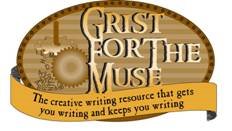 I think it all started when I lost the all of the data on my USB jumpdrive when Elvira, my imposing feline office-guardian, leapt off of the monitor, landed on the edge of my laptop, causing it to do a complete flip and landing on the jumpdrive inserted in the USB port when it hit the floor. The good news: the jump drive must have absorbed all of the impact when it landed and the laptop was fine. The bad news: It fried the drive... and I hadn't backed up the drive in MONTHS. I should know better. And considering that I had data on it was more valuable to me than a horde of gold buried in a rabid survivalist's back yard, I sunk into a morass of self-pity and self-loathing. The contents included: a completed book proposal, all of the data for the Fantasy and Sci-Fi JumpStart Jar tickets (which I had been wrapping up at the time of the "Leaping Cat Incident," the spreadsheet that had been tracking all of the books that I had bought or read since 2004, (which hadn't been updated in about 6 months), along with dozens of other projects in various states in completion.
I think it all started when I lost the all of the data on my USB jumpdrive when Elvira, my imposing feline office-guardian, leapt off of the monitor, landed on the edge of my laptop, causing it to do a complete flip and landing on the jumpdrive inserted in the USB port when it hit the floor. The good news: the jump drive must have absorbed all of the impact when it landed and the laptop was fine. The bad news: It fried the drive... and I hadn't backed up the drive in MONTHS. I should know better. And considering that I had data on it was more valuable to me than a horde of gold buried in a rabid survivalist's back yard, I sunk into a morass of self-pity and self-loathing. The contents included: a completed book proposal, all of the data for the Fantasy and Sci-Fi JumpStart Jar tickets (which I had been wrapping up at the time of the "Leaping Cat Incident," the spreadsheet that had been tracking all of the books that I had bought or read since 2004, (which hadn't been updated in about 6 months), along with dozens of other projects in various states in completion.I should know better. I've worked both in IT and technical writing for over a decade now, and have seen similar catastrophic data loss many times. Did I learn anything?
I spent days scouring the internet for tricks to revive the drive. I even tried to solder it back together (which appeared to be successful), but all it did was make the broken drive hot enough to burn my hand. But losing data is like losing someone close to you... and you must go through the grieving process mentioned in Elisabeth Kubler-Ross' book, On Death and Dying
- Denial - You can fix this jump drive enough to get the data off of it. All I need is it to let me copy a few files... You're not so stupid as not to have backed this up this week... right?!?
- Anger - Damn cat! How dare you jump on MY computer! POS jumpdrive! How could you break after such a perfect flip and then crashing down to the floor so far from the desktop above!? Haven't they tested these types of scenarios in Quality Control?!?
- Bargaining - Please, please, PLEASE let me have backed this up to an obscure folder somewhere on the external HD... I PROMISE to set up extensive alarms and reminders in my Outlook and Palm Pilot to nag me incessantly to back-up if you'll JUST LET ME RETRIEVE MY FILES THIS ONE TIME! Please?
- Depression - I can't believe I was sooooo stupid. Those files were a ticket to the best-seller list for me... I'll never be able to create anything as brilliant as this again...
- Acceptance - Now?
